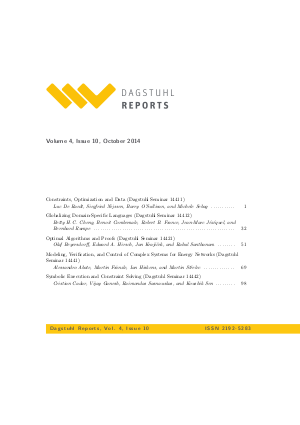Dagstuhl Reports, Volume 4, Issue 10
-
Part of:
Volume:
Dagstuhl Reports, Volume 4
Journal: Dagstuhl Reports (DagRep)

Event
- Dagstuhl Seminars 14411, 14412, 14421, 14441, 14442
Publication Details
- published at: 2015-02-19
- Publisher: Schloss Dagstuhl – Leibniz-Zentrum für Informatik
- DBLP: db/journals/dagstuhl-reports/dagstuhl-reports4
Access Numbers
- Detailed Access Statistics available here
-
Total Document Accesses (updated on a weekly basis):
0PDF Downloads
Documents
Dagstuhl Reports, Volume 4, Issue 10, October 2014, Complete Issue
Abstract
Cite as
Dagstuhl Reports, Volume 4, Issue 10, Schloss Dagstuhl – Leibniz-Zentrum für Informatik (2015)
Copy BibTex To Clipboard
@Article{DagRep.4.10,
title = {{Dagstuhl Reports, Volume 4, Issue 10, October 2014, Complete Issue}},
journal = {Dagstuhl Reports},
ISSN = {2192-5283},
year = {2015},
volume = {4},
number = {10},
publisher = {Schloss Dagstuhl -- Leibniz-Zentrum f{\"u}r Informatik},
address = {Dagstuhl, Germany},
URL = {https://drops.dagstuhl.de/entities/document/10.4230/DagRep.4.10},
URN = {urn:nbn:de:0030-drops-49002},
doi = {10.4230/DagRep.4.10},
annote = {Keywords: Dagstuhl Reports, Volume 4, Issue 10, October 2014, Complete Issue}
}
Dagstuhl Reports, Table of Contents, Volume 4, Issue 10, 2014
Abstract
Cite as
Dagstuhl Reports, Volume 4, Issue 10, pp. i-ii, Schloss Dagstuhl – Leibniz-Zentrum für Informatik (2015)
Copy BibTex To Clipboard
@Article{DagRep.4.10.i,
title = {{Dagstuhl Reports, Table of Contents, Volume 4, Issue 10, 2014}},
pages = {i--ii},
journal = {Dagstuhl Reports},
ISSN = {2192-5283},
year = {2015},
volume = {4},
number = {10},
publisher = {Schloss Dagstuhl -- Leibniz-Zentrum f{\"u}r Informatik},
address = {Dagstuhl, Germany},
URL = {https://drops.dagstuhl.de/entities/document/10.4230/DagRep.4.10.i},
URN = {urn:nbn:de:0030-drops-48992},
doi = {10.4230/DagRep.4.10.i},
annote = {Keywords: Dagstuhl Reports, Table of Contents, Volume 4, Issue 10, 2014}
}
Constraints, Optimization and Data (Dagstuhl Seminar 14411)
Abstract
Cite as
Luc De Raedt, Siegfried Nijssen, Barry O'Sullivan, and Michele Sebag. Constraints, Optimization and Data (Dagstuhl Seminar 14411). In Dagstuhl Reports, Volume 4, Issue 10, pp. 1-31, Schloss Dagstuhl – Leibniz-Zentrum für Informatik (2015)
Copy BibTex To Clipboard
@Article{deraedt_et_al:DagRep.4.10.1,
author = {De Raedt, Luc and Nijssen, Siegfried and O'Sullivan, Barry and Sebag, Michele},
title = {{Constraints, Optimization and Data (Dagstuhl Seminar 14411)}},
pages = {1--31},
journal = {Dagstuhl Reports},
ISSN = {2192-5283},
year = {2015},
volume = {4},
number = {10},
editor = {De Raedt, Luc and Nijssen, Siegfried and O'Sullivan, Barry and Sebag, Michele},
publisher = {Schloss Dagstuhl -- Leibniz-Zentrum f{\"u}r Informatik},
address = {Dagstuhl, Germany},
URL = {https://drops.dagstuhl.de/entities/document/10.4230/DagRep.4.10.1},
URN = {urn:nbn:de:0030-drops-48901},
doi = {10.4230/DagRep.4.10.1},
annote = {Keywords: Data mining, constraint programming, machine learning}
}
Globalizing Domain-Specific Languages (Dagstuhl Seminar 14412)
Abstract
Cite as
Betty H. C. Cheng, Benoit Combemale, Robert B. France, Jean-Marc Jézéquel, and Bernhard Rumpe. Globalizing Domain-Specific Languages (Dagstuhl Seminar 14412). In Dagstuhl Reports, Volume 4, Issue 10, pp. 32-50, Schloss Dagstuhl – Leibniz-Zentrum für Informatik (2015)
Copy BibTex To Clipboard
@Article{cheng_et_al:DagRep.4.10.32,
author = {Cheng, Betty H. C. and Combemale, Benoit and France, Robert B. and J\'{e}z\'{e}quel, Jean-Marc and Rumpe, Bernhard},
title = {{Globalizing Domain-Specific Languages (Dagstuhl Seminar 14412)}},
pages = {32--50},
journal = {Dagstuhl Reports},
ISSN = {2192-5283},
year = {2015},
volume = {4},
number = {10},
editor = {Cheng, Betty H. C. and Combemale, Benoit and France, Robert B. and J\'{e}z\'{e}quel, Jean-Marc and Rumpe, Bernhard},
publisher = {Schloss Dagstuhl -- Leibniz-Zentrum f{\"u}r Informatik},
address = {Dagstuhl, Germany},
URL = {https://drops.dagstuhl.de/entities/document/10.4230/DagRep.4.10.32},
URN = {urn:nbn:de:0030-drops-48913},
doi = {10.4230/DagRep.4.10.32},
annote = {Keywords: Modelling, Domain Specific Language, Software, Coordination, Globalization, Heterogeneous Complex Systems, DSL, UML, Composition}
}
Optimal algorithms and proofs (Dagstuhl Seminar 14421)
Abstract
Cite as
Olaf Beyersdorff, Edward A. Hirsch, Jan Krajicek, and Rahul Santhanam. Optimal algorithms and proofs (Dagstuhl Seminar 14421). In Dagstuhl Reports, Volume 4, Issue 10, pp. 51-68, Schloss Dagstuhl – Leibniz-Zentrum für Informatik (2015)
Copy BibTex To Clipboard
@Article{beyersdorff_et_al:DagRep.4.10.51,
author = {Beyersdorff, Olaf and Hirsch, Edward A. and Krajicek, Jan and Santhanam, Rahul},
title = {{Optimal algorithms and proofs (Dagstuhl Seminar 14421)}},
pages = {51--68},
journal = {Dagstuhl Reports},
ISSN = {2192-5283},
year = {2015},
volume = {4},
number = {10},
editor = {Beyersdorff, Olaf and Hirsch, Edward A. and Krajicek, Jan and Santhanam, Rahul},
publisher = {Schloss Dagstuhl -- Leibniz-Zentrum f{\"u}r Informatik},
address = {Dagstuhl, Germany},
URL = {https://drops.dagstuhl.de/entities/document/10.4230/DagRep.4.10.51},
URN = {urn:nbn:de:0030-drops-48923},
doi = {10.4230/DagRep.4.10.51},
annote = {Keywords: computational complexity, proof complexity, approximation algorithms, optimal algorithms, optimal proof systems, speedup theorems}
}
Modeling, Verification, and Control of Complex Systems for Energy Networks (Dagstuhl Seminar 14441)
Abstract
Cite as
Alessandro Abate, Martin Fränzle, Ian Hiskens, and Martin Strelec. Modeling, Verification, and Control of Complex Systems for Energy Networks (Dagstuhl Seminar 14441). In Dagstuhl Reports, Volume 4, Issue 10, pp. 69-97, Schloss Dagstuhl – Leibniz-Zentrum für Informatik (2015)
Copy BibTex To Clipboard
@Article{abate_et_al:DagRep.4.10.69,
author = {Abate, Alessandro and Fr\"{a}nzle, Martin and Hiskens, Ian and Strelec, Martin},
title = {{Modeling, Verification, and Control of Complex Systems for Energy Networks (Dagstuhl Seminar 14441)}},
pages = {69--97},
journal = {Dagstuhl Reports},
ISSN = {2192-5283},
year = {2015},
volume = {4},
number = {10},
editor = {Abate, Alessandro and Fr\"{a}nzle, Martin and Hiskens, Ian and Strelec, Martin},
publisher = {Schloss Dagstuhl -- Leibniz-Zentrum f{\"u}r Informatik},
address = {Dagstuhl, Germany},
URL = {https://drops.dagstuhl.de/entities/document/10.4230/DagRep.4.10.69},
URN = {urn:nbn:de:0030-drops-48939},
doi = {10.4230/DagRep.4.10.69},
annote = {Keywords: Analysis, control, and verification of complex stochastic systems; formal synthesis; reliability engineering and assessment; energy networks}
}
Symbolic Execution and Constraint Solving (Dagstuhl Seminar 14442)
Abstract
Cite as
Christian Cadar, Vijay Ganesh, Raimondas Sasnauskas, and Koushik Sen. Symbolic Execution and Constraint Solving (Dagstuhl Seminar 14442). In Dagstuhl Reports, Volume 4, Issue 10, pp. 98-114, Schloss Dagstuhl – Leibniz-Zentrum für Informatik (2015)
Copy BibTex To Clipboard
@Article{cadar_et_al:DagRep.4.10.98,
author = {Cadar, Christian and Ganesh, Vijay and Sasnauskas, Raimondas and Sen, Koushik},
title = {{Symbolic Execution and Constraint Solving (Dagstuhl Seminar 14442)}},
pages = {98--114},
journal = {Dagstuhl Reports},
ISSN = {2192-5283},
year = {2015},
volume = {4},
number = {10},
editor = {Cadar, Christian and Ganesh, Vijay and Sasnauskas, Raimondas and Sen, Koushik},
publisher = {Schloss Dagstuhl -- Leibniz-Zentrum f{\"u}r Informatik},
address = {Dagstuhl, Germany},
URL = {https://drops.dagstuhl.de/entities/document/10.4230/DagRep.4.10.98},
URN = {urn:nbn:de:0030-drops-48940},
doi = {10.4230/DagRep.4.10.98},
annote = {Keywords: Symbolic Execution, Software Testing, Automated Program Analysis, Constraint Solvers}
}